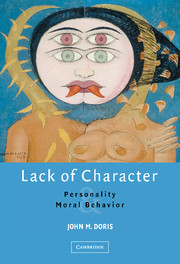Book contents
- Frontmatter
- Contents
- Preface: A Renaissance of Virtue
- Lack of Character
- 1 Joining the Hunt
- 2 Character and Consistency
- 3 Moral Character, Moral Behavior
- 4 The Fragmentation of Character
- 5 Judging Character
- 6 From Psychology to Ethics
- 7 Situation and Responsibility
- 8 Is There Anything to Be Ashamed Of?
- Notes
- References
- Acknowledgments
- Author Index
- Subject Index
4 - The Fragmentation of Character
Published online by Cambridge University Press: 05 July 2014
- Frontmatter
- Contents
- Preface: A Renaissance of Virtue
- Lack of Character
- 1 Joining the Hunt
- 2 Character and Consistency
- 3 Moral Character, Moral Behavior
- 4 The Fragmentation of Character
- 5 Judging Character
- 6 From Psychology to Ethics
- 7 Situation and Responsibility
- 8 Is There Anything to Be Ashamed Of?
- Notes
- References
- Acknowledgments
- Author Index
- Subject Index
Summary
Nothing is less like him than himself.
DiderotRameau's nephew, it seems, is a bit of a cipher: by turns foolish and sagacious, dissolute and upstanding, beggarly and magisterial. Diderot (1966: 58) would have us question the nephew's sanity; radical personal inconsistency seems to signal a breakdown of mental health. Yet it's not crazy to think that someone could be courageous in physical but not moral extremity, or be moderate with food but not sex, or be honest with spouses but not with taxes. If we take such thoughts seriously, we'll qualify our attributions: “physical courage” or “moral courage,” instead of “courage,” and so on. Would things were so simple. With a bit of effort, we can imagine someone showing physical courage on the battlefield, but cowering in the face of storms, heights, or wild animals. Here we go again: “battlefield physical courage,” “storms physical courage,” “heights physical courage,” and “wild animals physical courage.” Things can get still trickier: Someone might exhibit battlefield courage in the face of rifle fire but not in the face of artillery fire (Miller 2000: 54—9). If we didn't grow sick of it, we could play this little game all day. Such sport is more than simpleminded diversion, however; it is the beginning of an empirically adequate alternative to globalism. But I've not yet fully established the need for such an alternative: There are defensible interpretations of the data more friendly to globalist conceptions of character than is mine. Nevertheless, I’d like to think I’ve come by my views honestly; comparing the going alternatives, I now try to show, gives us good reason to favor my way of doing things.
- Type
- Chapter
- Information
- Lack of CharacterPersonality and Moral Behavior, pp. 62 - 91Publisher: Cambridge University PressPrint publication year: 2002



